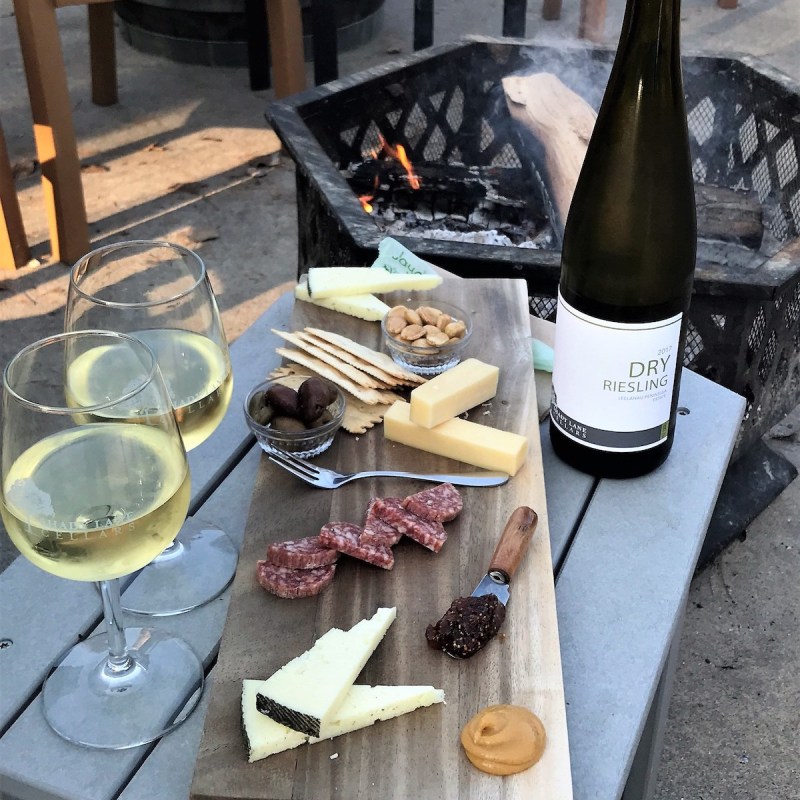
Like many of the world’s famous wine regions — Bordeaux in France and Italy’s Piedmont region, for example — Michigan’s Leelanau Peninsula is on the 45th parallel, making it an excellent area for producing fantastic wine.
Videos by TravelAwaits
North of Traverse City, the Leelanau Peninsula is one of Michigan’s five American Viticultural Areas (AVAs). An AVA defines a grape-growing region with specific geographic and climate qualities. Lake Michigan’s “lake effect” environment supports growing classic vinifera grape varieties, including riesling, chardonnay, pinot noir, and cabernet franc. These grapes are hearty enough to withstand the sometimes harsh Michigan winters.
Leelanau Peninsula has three loops to explore: the Sleeping Bear Loop, the Northern Peninsula Loop, and the Grand Traverse Bay Loop. This article describes all seven of the fantastic wineries in the Grand Traverse Bay Loop. I’ve listed these wineries in the order that I visited them.

1. Black Star Farms, Suttons Bay
Situated on a 160-acre estate about 13 miles from downtown Traverse City, Black Star Farms features a bed and breakfast-style destination inn, making it the perfect place to establish a weekend base for exploring the other area wineries.
It isn’t easy to choose a favorite wine at this winery because it has a wide variety to try — red, white, dessert, sparkling, rose, and fruit. Michigan is known for its cherries and apples, and I enjoyed the cherry wine. The semi-dry wine created entirely from Northern Michigan cherries offers a delightful combination of flavors: tart and sweet cherry with a hint of spice. In addition to wine, it has a distillery that produces a variety of products.
If you’re visiting between May and October, plan to go around mealtime, as the Hearth and Vine Café offers farm-to-table dining highlighting its wine and spirits. You’ll find dishes like the cold mixed berry soup that showcases its 2017 pinot gris. In addition, Black Star transformed its red grape skins into flour used to make the dough for its wood-fired pizza. Try the potato bacon pizza topped with a combination of aged Gruyére and fromage blanc from Leelanau Cheese.
Pro Tip: In addition to wine tastings, Black Star Farms offers three miles of hiking and biking trails and an equestrian facility with an indoor and outdoor riding arena. In winter, you can rent snowshoes to explore the area. So while Traverse City has lots of action, you’ll find plenty to do to keep you busy for an entire weekend without leaving the venue.

2. Shady Lane Cellars, Suttons Bay
Situated on the Leelanau TART Trail, Shady Lane Cellars makes the perfect stop for a glass of wine and a charcuterie board to fuel your continued bike ride. It uses 100 percent estate-grown grapes to create its wine.

I enjoyed the Late Harvest Riesling in the fieldstone tasting room, a dessert wine that makes the perfect finish to a meal. Shady Lane Cellars harvests these grapes in December’s cold weather to concentrate the dessert wine’s sweetness. In addition, the wine has bright notes of candied citrus and pear.

During the summer months, you’ll enjoy the attractive outdoor bar and seating area. In the Adirondack chairs, at the top of the hill is a fun place to sip a glass and appreciate the vineyard view.
Shady Lane Cellars is one of two SIP (Sustainability in Practice) certified wineries outside California. During my time at Shady Lane Cellars, I learned some characteristics of this certification, including dry farming and not mowing every row to retain the beneficial bugs. The vineyard also has a few wildflower plots to bring in those beneficial bugs.
Pro Tip: I recommend that you make reservations as the tasting room has limited indoor seating space.

3. Brengman Brothers, Traverse City
Brengman Brothers is a micro-winery that creates wine from estate-grown grapes. I visited the 25-acre Crain Hill Vineyard, where it grows the gewurztraminer, a popular Michigan grape that grows well in the climate. It’s a complex grape that inspires different sweet and floral notes.

One of my favorite wines at Brengman Brothers is its blanc de blancs extra brut, playfully named DaGudScht. This top-of-the-line Leelanau bubbly has a depth of flavor and body.
The micro-winery features a pleasant outdoor area with fire pits that chase off the chill of Michigan’s crisp fall weather so that you can comfortably enjoy a glass outside and watch the sunset over the vineyard. The indoor tasting room has a modern vibe, with art on the walls lending pops of color to the bright and airy space.

Pro Tip: The winery will waive the tasting fee when you purchase two bottles of wine.
4. Two K Farms, Suttons Bay
Ten minutes north of Traverse City, Two K Farms’ tasting room features an outdoor patio with a stunning view of the West Grand Traverse Bay. Inside the tasting room, you’ll find exposed beams and chandeliers that create a rustic setting.
Two K Farms takes its name from the two brothers, George and Max Koskela, who manage it. Two K Farms produces hard cider in addition to making wine. Exemplifying the farm-to-glass philosophy, it creates all the wine and hard ciders onsite north of the tasting room. As a result, you’ll find various American, French, English, sangria, hopped, and barrel-aged style ciders on tap.
One of my favorite drinks from Two K Farms is the Leelanau Radler, a blend of estate riesling and heirloom apple juice. It incorporates two Michigan fruit crops, apples, and grapes, into one refreshing drink. You’ll find hints of spice, fresh apples, and lemon. Radler is German for cyclists, and it’s also a popular drink in Austria and Germany, where it’s made traditionally with beer and fruit juice or soda.
Pro Tip: On their website, you’ll find recipes for food pairings, along with some cocktail and mocktail recipes.

5. Mawby, Suttons Bay
In 1976, Larry Mawby planted the 14-acre Elm Valley estate vineyard. Today the original vignoles vines still produce grapes. Mawby is one of Michigan’s oldest commercial vineyards. In addition to Elm Valley, it also grows grapes on the 8-acre Sylt Road and the smaller Norvick Road property. It also utilizes fruit from other Michigan growers and growers and producers from California and Washington State.
Mawby specializes in sparkling wine, where it ferments each sparkling wine twice using either the traditional method (fermenting in the bottle) or the cuve close method (fermenting in one of its pressure tanks). The bottle-fermented wines age from 1 to 7 years. The winery immediately chills, filters, and bottles the tank-fermented wines.
One of my favorites at Mawby is Blanc, made using the traditional method, blanc de blanc from Peninsula Chardonnay, and riesling, and it has apple aromas and citrus flavors. It pairs well with seafood and plates of light pasta.
Pro Tip: For a seated tasting experience, make a reservation. This venue features two different tasting rooms with two separate reservations. Be sure you are reserving the tasting room you prefer.

6. Ciccone Vineyard & Winery, Suttons Bay
Located off Michigan 22 at the top of Hilltop Road in the Leelanau Peninsula, Ciccone Vineyard & Winery features award-winning 100 percent estate-grown wines. The winery produces reds and whites, in addition to cider. My favorite sip at Ciccone Winery was the Dolcetto that featured the grape’s typical astringent tannins, bright acidity, dark berry notes, and a dry finish.
Ciccone’s tasting room doesn’t require reservations, and seating is on a first come, first served basis. On Sunday and Thursday evenings during the summer, you’ll find live music. The rest of the year, check its calendar of events for more fun activities at the winery.

Pro Tip: In its pergola overlooking the vineyard, Ciccone hosts Live from the Hilltop each Sunday and Thursday summer evening, an event that features local musicians. It’s a great way to enjoy some music with your glass of wine.
7. Rove Estate, Traverse City
At 1,165 feet, Rove Estate’s tasting room sits on Leelanau County’s highest point. It’s the perfect place to drink a glass of wine while watching the sunset. You can see Sugar Loaf, Empire, and the highest point in Grand Traverse County from its deck.
Creighton Gallagher, a fifth-generation farmer, and his wife McKenzie welcome your family to the winery, even the kiddos. They have outdoor games to keep busy, fire pits, dance areas, and a trail loop where you can snowshoe or hike.
They grow nine varietals of vinifera grapes, including three reds. The Gallaghers use these to create small-batch artisan wines and use only estate-grown grapes. The elevation makes the perfect conditions for grapes — southern exposed slopes with abundant sunlight and cool-air drainage with protection from the frost.
One of my favorite wines at Rove Estate is the riesling that offers the aroma of fresh nectarines and citrus. It has a flavor of pear, peach, and a bit of candied ginger.
Pro Tip: Take time to explore the Rove Point Trail, an easy 10-minute walk to Leelanau Peninsula’s highest point.
If you’d like to explore another Michigan wine region, or visit more state sites, check out:
